In this roundup of Court Judgements, we look at the Supreme Court’s observation on custody of children where the child’s welfare is of paramount importance, the apex Court’s judgment regarding the retrospective change in rules affecting employee benefits, observation regarding the broader definition of dowry and the apex court’s directions to the State governments to not delay the identification and rehabilitation of Street Children.
Supreme Court: Rights of Parents are irrelevant when the Court decides custody on their child.
In Vasudha Sethi vs. Kiran V. Bhaskar, the Supreme Court observed that the rights of the parents are irrelevant, in case the court has already decided the issue of custody of their minor child. The bench of Justice Ajay Rastogi and Justice Abhay S. Oka observed that the welfare of the child is of paramount consideration and the custody of the child needs to be determined based on the welfare of the child.
In this particular case, the Punjab and Haryana High court has earlier issued several directions while allowing a petition for habeas corpus filed by the husband seeking custody of the minor child. The High court directed the mother to return to the USA along with the minor child on or before 30 September 2021.
The mother approached the Supreme Court, challenging this order. The mother contended that as the primary caregiver, her legal rights must be respected and protected by the court.
The Apex Court bench referred to Kanika Goel vs. the State of Delhi (2018) and Prateek Gupta vs. Shilpi Gupta (2018).
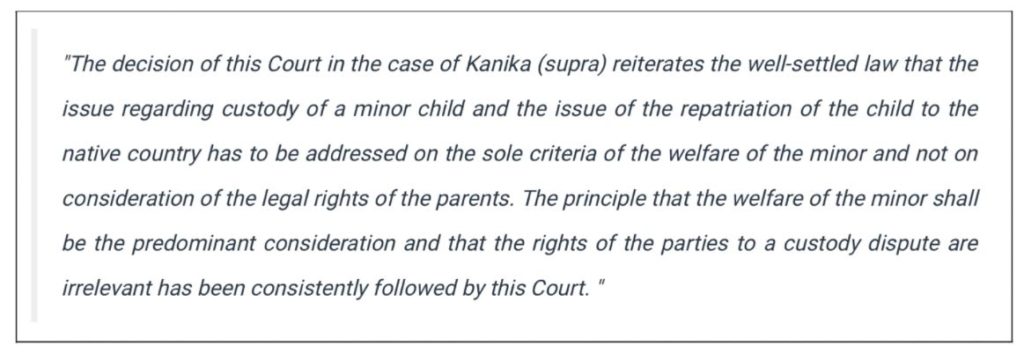
The court also cited Hindu Minority & Guardianship Act, 1956. As per Section 13 (1), the welfare of the minor is of paramount importance while appointing a guardian of a minor.
The court made the following observations:
- The Consideration of the well-being and welfare of the child must get precedence over the individual or personal rights of the parents.
- The rights of the parties litigating the custody issue are irrelevant.
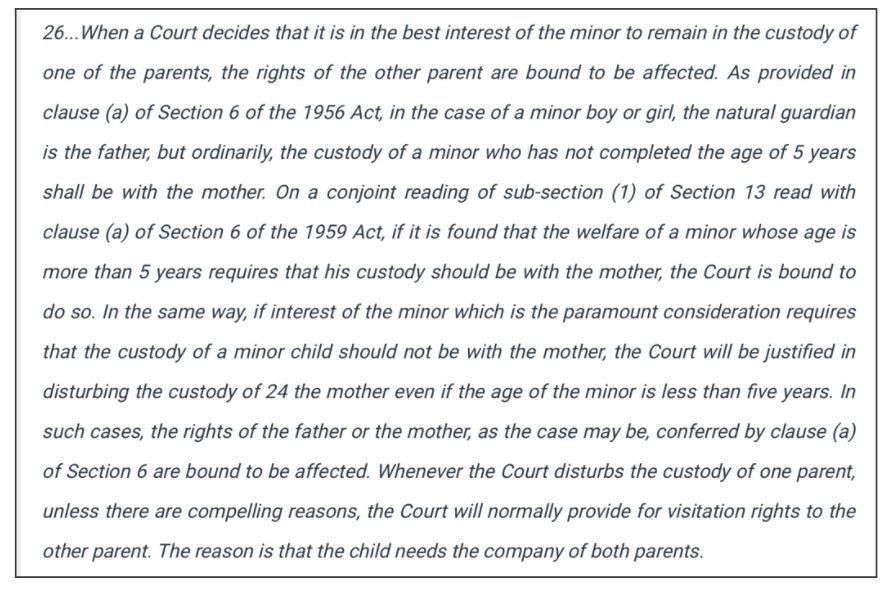
Considering these, the SC modified the directions of the High Court and stated that it would be left to the willingness or the priorities of the parent, in this case, the mother, who has been entrusted with the custody of the child. The court passed on an order with various conditions for both the mother & the father.
The Apex Court made it clear that the welfare of the child takes precedence and is of utmost importance in determining the custody of the child. Any of the parent’s rights regarding the custody of the child become irrelevant, with the welfare of the child being paramount.
Supreme Court: Any rules which take away the vested rights of employees retrospectively are in violation of Articles 14 and 21 of The Constitution.
The Apex Court observed that any amendment to the current rules which has a retrospective effect and takes away the benefits of the employees under the current rules is a violation of the tenets laid down in Article 14 and Article 21.
In the case of “The Punjab State Cooperative Agricultural Development Bank Ltd. Vs the Registrar, Cooperative Societies and Others” , the bench comprising of Justice Ajay Rastogi and Justice Abhay S. Oka observed that, if the employee has already been promoted and included in a particular pay scale, it cannot be taken away retrospectively with a new set of rules. This is in violation of Articles 14 & 16 of the Indian Constitution.
The case pertains to a Bank pension scheme that was introduced and later rolled back. The employees of Punjab State Co-operative Agricultural Development Bank Limited, Chandigarh were members of the Employees Provident Fund (EPF), the provisions of which were duly complied by employees and the employer.
As per the recommendations from the Punjab pay commission, the Bank introduced a new pension scheme for the employees in 1989 through the “Punjab State Cooperative Agricultural Land Mortgage Bank Service (Common Cadre) Rules 1978.” The employees were given an option to either choose this scheme or the one under EPF Act, 1952. Those who responded chose the new scheme and were paid until 2010.
In May 2010, the Bank found the scheme to be unviable on account of a shortage of funds. The Bank stated that the pension scheme would not apply to employees employed after 01 January 2004. Despite the Registrar turning down this proposal, the Board of Directors of the Bank went ahead and reverted to the earlier Contributory PF scheme.
The Bench observed that the non-availability of financial resources cannot be cited as a reason for discontinuing a scheme.
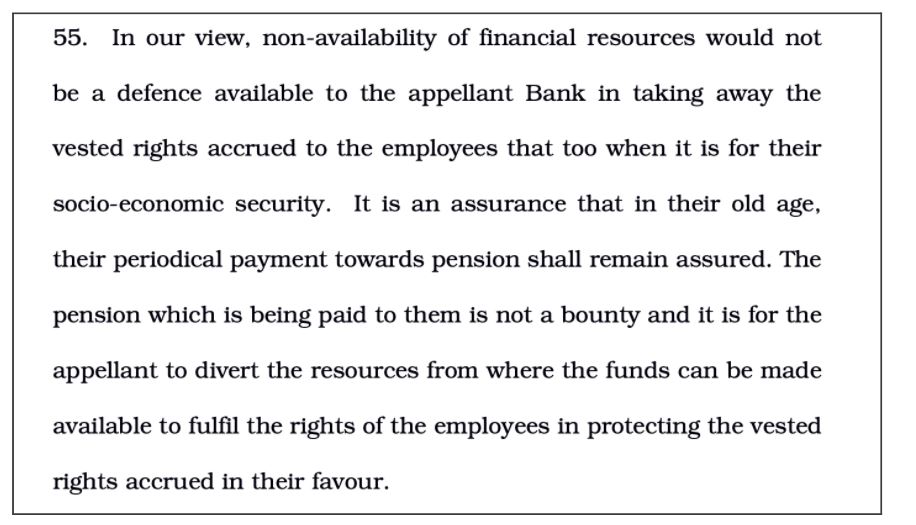
The court referred to its own judgement in Chairman, Railway Board & Ors, where it stated that a rule which reverses an earlier benefit is considered as a violation of Articles 14 & 16 of the constitution.

The bench directed that the arrears be paid towards the pension of the retired employees up to 31 December 2021, in 12 monthly installments, by the end of December 2022. For those employees who accepted a one-time settlement, the dues need to be paid after adjusting for the arrears.
Thus, in the current case, the SC agreed with its earlier rulings, where any new rules that retrospectively make changes to the benefits of the employees are in violation of the rights granted by the Indian Constitution.
Supreme Court: Observes that demand of money for the construction of a house is a dowry demand and is a punishable offence.
A bench comprising of the Chief Justice NV Ramana, Justice AS Bopanna and Justice Hima Kohli, observed that the demand for money for the construction of a house is a dowry demand and is a punishable offence under IPC 304B. It stated that the word ‘Dowry” needs to have an expansive meaning to include any demand made on a woman, whether in respect to property or other valuable security.
In the case State of Madhya Pradesh vs. Jogendra, the trial court convicted the husband and the father-in-law under IPC Sections 304B, 306 and 498A. The accused demanded money from the deceased wife for constructing a house, which her family was unable to provide. She was subjected to constant harassment and cruelty that led to her suicide.
In appeal, the High Court held that the demand for money for the construction of a house cannot be treated as a demand for dowry and hence the offence under IPC Section 304B cannot be held against them. The apex court disagreed with the views of the high court and observed that a liberal interpretation needs to be taken up which would take into consideration the intention of the parties.
Any interpretation of the provision of the law that defeats the idea of having the law in place needs to be shunned and an interpretation that promotes the idea needs to be considered.
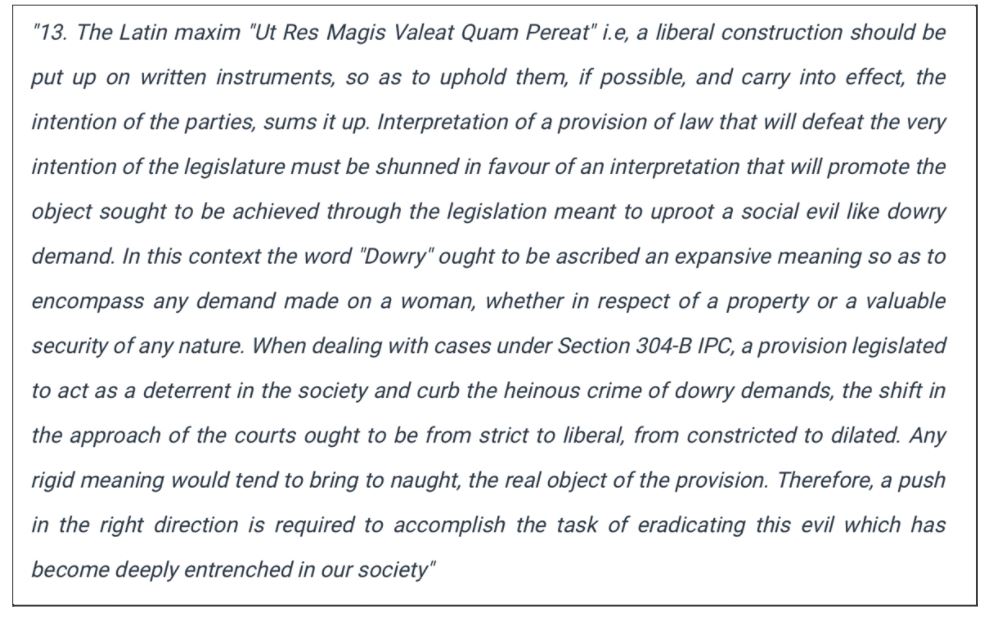
The Apex Court observed that the trial court has correctly interpreted the demand for money to construct a house falling within the definition of the word ‘dowry’.
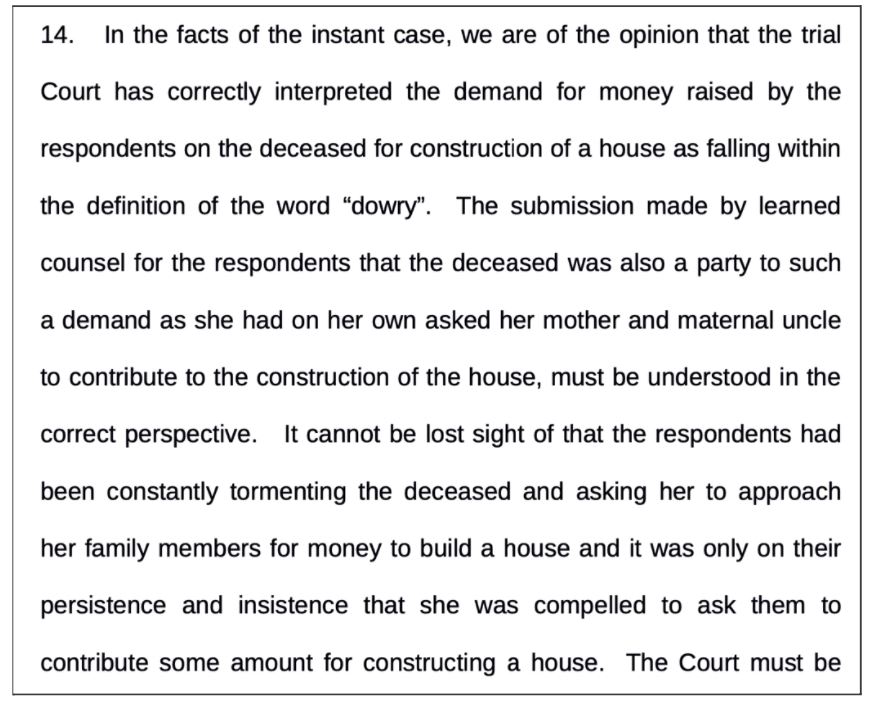
Thus, the bench restored the conviction of the accused under Section 304B IPC.
Supreme Court: Directs States not to delay the identification and rehabilitation process of Street Children
In the perusal of an affidavit filed by the National Commission for Protection of Child Rights (NCPCR), a bench comprising of Justice L. Nageswara Rao and Justice B.V. Nagarathna directed the states to complete the identification and rehabilitation process of the Children in Street Situations (CISS) at the earliest.
In view of the slow progress in the identification process, the Supreme Court directed all the District Magistrates to involve Special Juvenile Police Units, District Legal Service Authorities, and voluntary organizations.

The Court has also directed the states to frame a policy for rehabilitation of Street children with the guidance of the NCPCR.

Additional Solicitor General, K.M. Natraj appearing on behalf of NCPCR highlighted three aspects of this issue before the court.
- The states were not uploading information of Bal Swaraj – CISS portal. As per the data, only 9000 children were identified, where-in the actual numbers could be more than 10 lakhs.
- An NGO has identified 2 lakh children in West Bengal and Maharashtra. While West Bengal has done a good job, the same cannot be said about Maharashtra.
- NCPCR is in the process of formulating a model policy that can be adopted by the States.
In its order, the apex court directed the State governments to instruct all the concerned authorities not to delay the identification and rehabilitation of the Street Children.
It stated that although the progress of identification of street children and providing them with the basic amenities is slow, the state governments have initiated the work towards discharging their constitutional duty of protecting the marginalized street children.
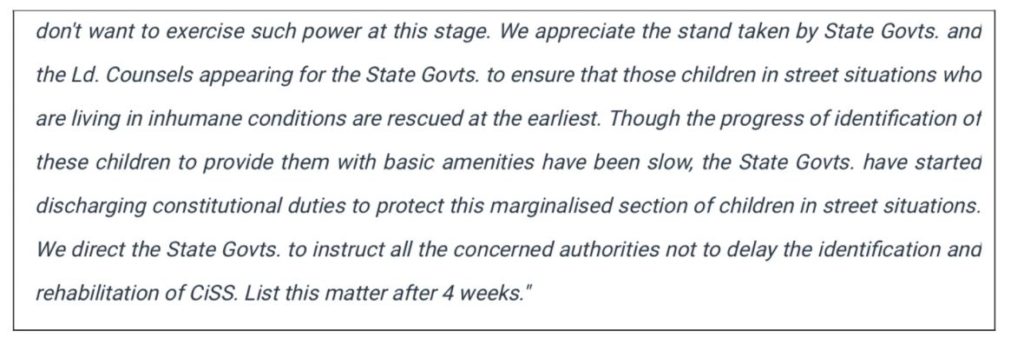
Featured Image: Important Court Judgements


